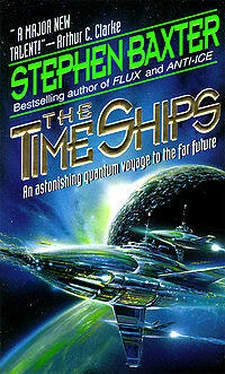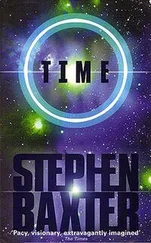And so they had done with us. At such speeds, the Morlock told me, we should reach the vicinity of the earth in just forty-seven hours.
I looked around the capsule, but I could see no signs of rockets, or any other motive force. I floated in that little cabin, feeling huge and clumsy; my beard drifted before my face in a gray cloud, and my jacket persisted in rucking itself up around my shoulder-blades. “I understand the principles of the launch,” I said to Nebogipfel. “But how is this capsule steered?”
He hesitated for some seconds. “It is not. Have you misunderstood what I have told you? The capsule needs no motive force, for the velocity imparted to it by the Sphere—”
“Yes,” I said anxiously, “I followed all of that. But what if, now, we were to detect that we were off track, by some mistake of our launch — that we were going to miss the earth?” For I realized that the most minute error at the Sphere, of even a fraction of a degree of arc, could — thanks to the immensity of inter-planetary distances — cause us to miss the earth by millions of miles — and then, presumably, we would go sailing off forever into the void between the stars, allocating blame until our air expired!
He seemed confused. “There has been no mistake.”
“But still,” I stressed, “if there were, perhaps through some mechanical flaw — then how should we, in this capsule, correct our trajectory?”
He thought for some time before answering. “Flaws do not occur,” he repeated. “And so this capsule has no need of corrective propulsion, as you suggest.”
At first I could not quite believe this, and I had to have Nebogipfel repeat it several times before I accepted its truth. But true it was! — after launch, the craft flew between the planets with no more intelligence than a hurled stone: my capsule fell across space as helpless as Verne’s lunar cannon-shot.
As I protested the foolishness of this arrangement, I got the impression that the Morlock was becoming shocked — as if I were pressing some debating point of moral dubiety on a vicar of ostensibly open mind — and I gave it up.
The capsule twisted slowly, causing the remote stars and the immense wall that was the Sphere to wheel around us; I think that without that rotation I might have been able to imagine that I was safe and at rest, in some desert night, perhaps; but the tumbling made it impossible to forget that I was in a remote, fragile box, falling without support or attachment or means of direction. I spent the first few of my hours in that capsule in a paralysis of fear! I could not grow accustomed to the clarity of the walls around us, nor to the idea that, now that we were launched, we had no means of altering our trajectory. The journey had the elements of a nightmare — a fall through endless darkness, with no means of adjusting the situation to save myself. And there you have, in a nutshell, the essential difference between the minds of Morlock and human. For what man would trust his life to a ballistic journey, across inter-planetary distances, without any means of altering his course? But such was the New Morlock way: after a half-million years of steadily perfected technology, the Morlock would trust himself unthinkingly to his machines, for his machines never failed him.
I, though, was no Morlock!
Gradually, however, my mood softened. Apart from the slow tumble of the capsule, which continued throughout my journey to the earth, the hours passed in a stillness and silence broken only by the whisper-like breathing of my Morlock companion. The craft was tolerably warm, and so I was suspended in complete physical comfort. The walls were made of that extruding Floor-stuff, and, at a touch from Nebogipfel, I was provided with food, drink and other requirements, although the selection was more limited than in the Sphere, which had a larger Memory than our capsule.
So we sailed through the grand cathedral of inter-planetary space with utter ease. I began to feel as if I were disembodied, and a mood of utter detachment and independence settled on me. It was not like a journey, nor even — after those first hours — a nightmare; instead, it took on the qualities of a dream.
[20]
My Account of the Far Future
On the second day of our flight, Nebogipfel asked me once again about my first journey into futurity.
“You managed to retrieve your machine from the Morlocks,” he prompted. “And you went on, further into the future of that History…”
“For a long period I simply held onto the machine,” I remembered, “much as now I am clinging to these poles, uncaring where I went. At last I brought myself to look at my chronometric dials, and I found that the hands were sweeping, with immense rapidity, further into futurity.
“You must recall,” I told him, “that in this other History the axis of the earth, and its rotation, had not been straightened out. Still day and night flickered like wings over the earth, and still the sun’s path dipped between its solstices as the seasons wore away. But gradually I became aware of a change: that, despite my continuing velocity through time, the flickering of night and day returned, and grew more pronounced.”
“The earth’s rotation was slowing,” Nebogipfel said.
“Yes. At last the days spread across centuries. The sun had become a dome — huge and angry — glowing with its diminished heat. Occasionally its illumination brightened — spasms which recalled its former brilliancy. But each time it reverted to its sullen crimson.
“I began to slow my plummeting through time…”
When I stopped, it was on such a landscape as I had always imagined might prevail on Mars. The huge, motionless sun hung on the horizon; and in the other half of the sky, stars like bones still shone. The rocks strewn across the land were a virulent red, stained an intense green, as if by lichen, on every west-facing plane.
My machine stood on a beach which sloped down to a sea, so still it might have been coated in glass. The air was cold, and quite thin; I felt as if I were suspended atop some remote mountain. Little remained of the familiar topography of the Thames valley; I imagined how the scraping of glaciation, and the slow breathing of the seas, must have obliterated all trace of the landscape I had known — and all trace of Humanity…
Nebogipfel and I hovered there, suspended in space in our shining box, and I whispered my tale of far futurity to him; in that calm, I rediscovered details beyond those I recounted to my friends in Richmond.
“I saw a thing like a kangaroo,” I recalled. “It was perhaps three feet tall… squat, with heavy limbs and rounded shoulders. It loped across the beach — it looked forlorn, I remember its coat of gray fir was tangled, and it pawed feebly at the rocks, evidently trying to prize free handfuls of lichen. There was a sense of great degeneration about it. Then, I was surprised to see that the thing had five feeble digits to both its fore- and hind-feet… And it had a prominent forehead and forward-looking eyes. Its hints of humanity were most disagreeable!
“But then there was a touch at my ear — like a hair, stroking me — and I turned in my saddle.
“There was a creature just behind the machine. It was like a centipede, I suppose, but three or four feet wide, perhaps thirty feet in length, its body segmented and the chitin of its plates — they were crimson — scraping as it moved. Cilia, each a foot long, waved in the air, moist; and it was one of these which had touched me. Now this beast lifted up its stump of a head, and its mouth gaped wide, with damp mandibles waving before it; it had a hexagonal arrangement of eyes which swiveled about, fixing on me.
“I touched my lever, and slipped through time away from this monster.
Читать дальше
Конец ознакомительного отрывка
Купить книгу









